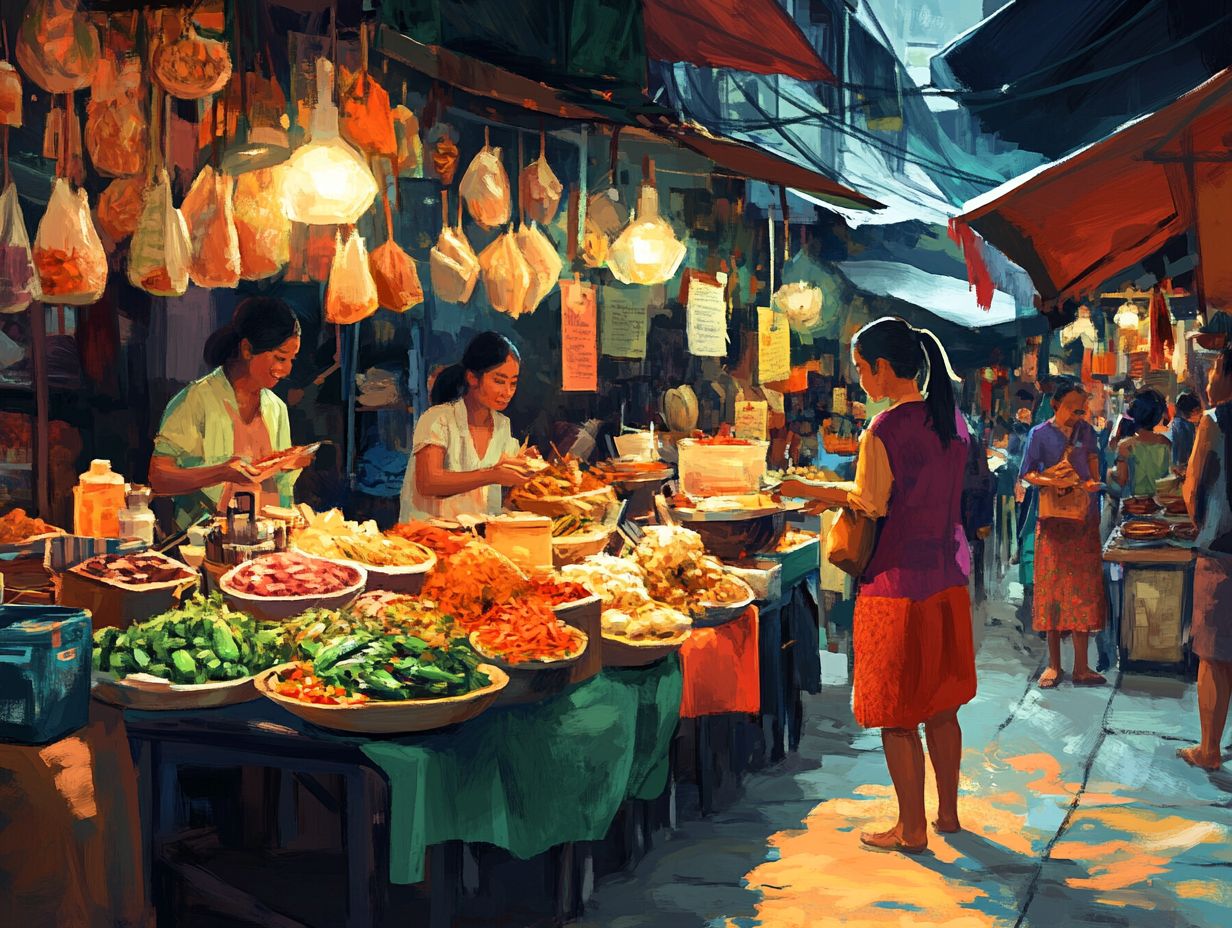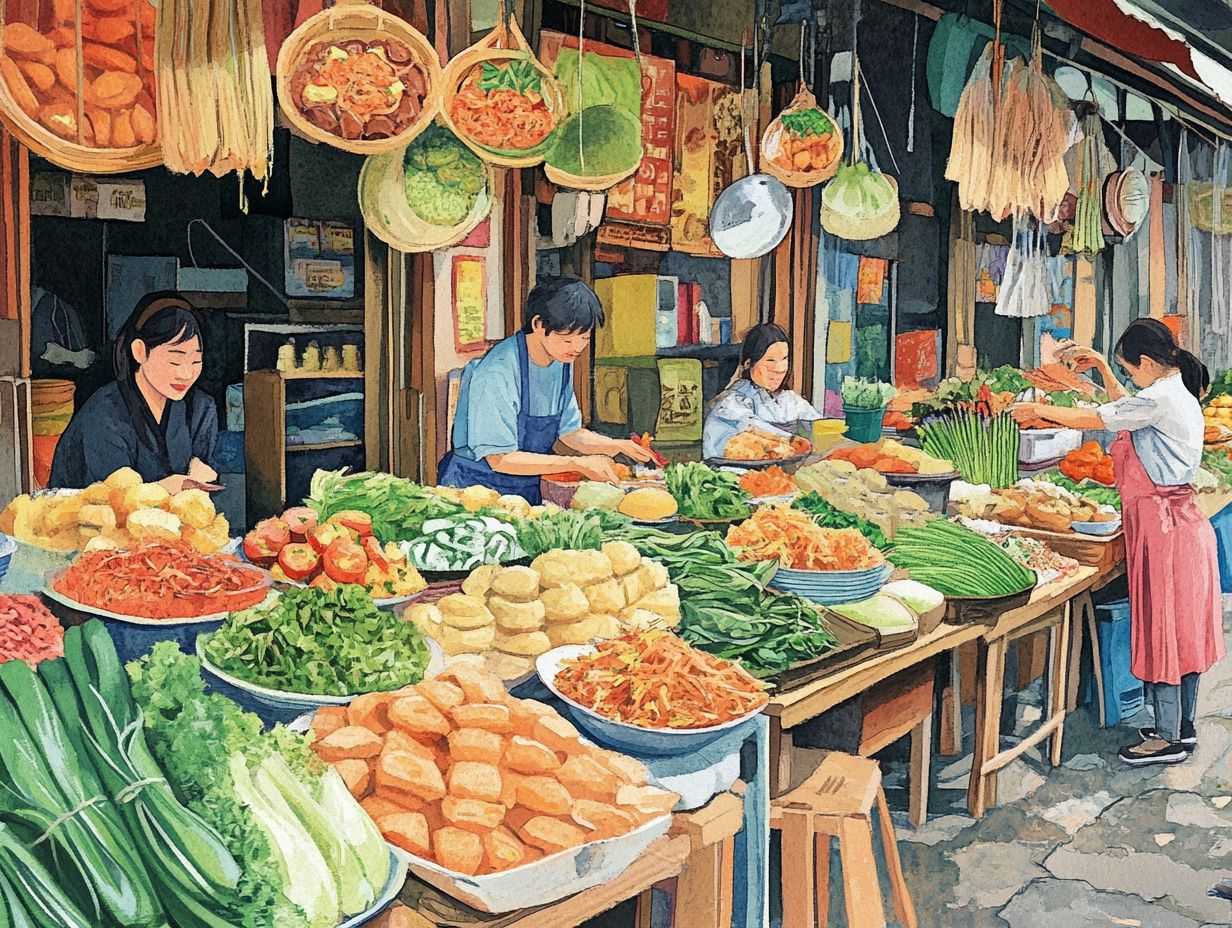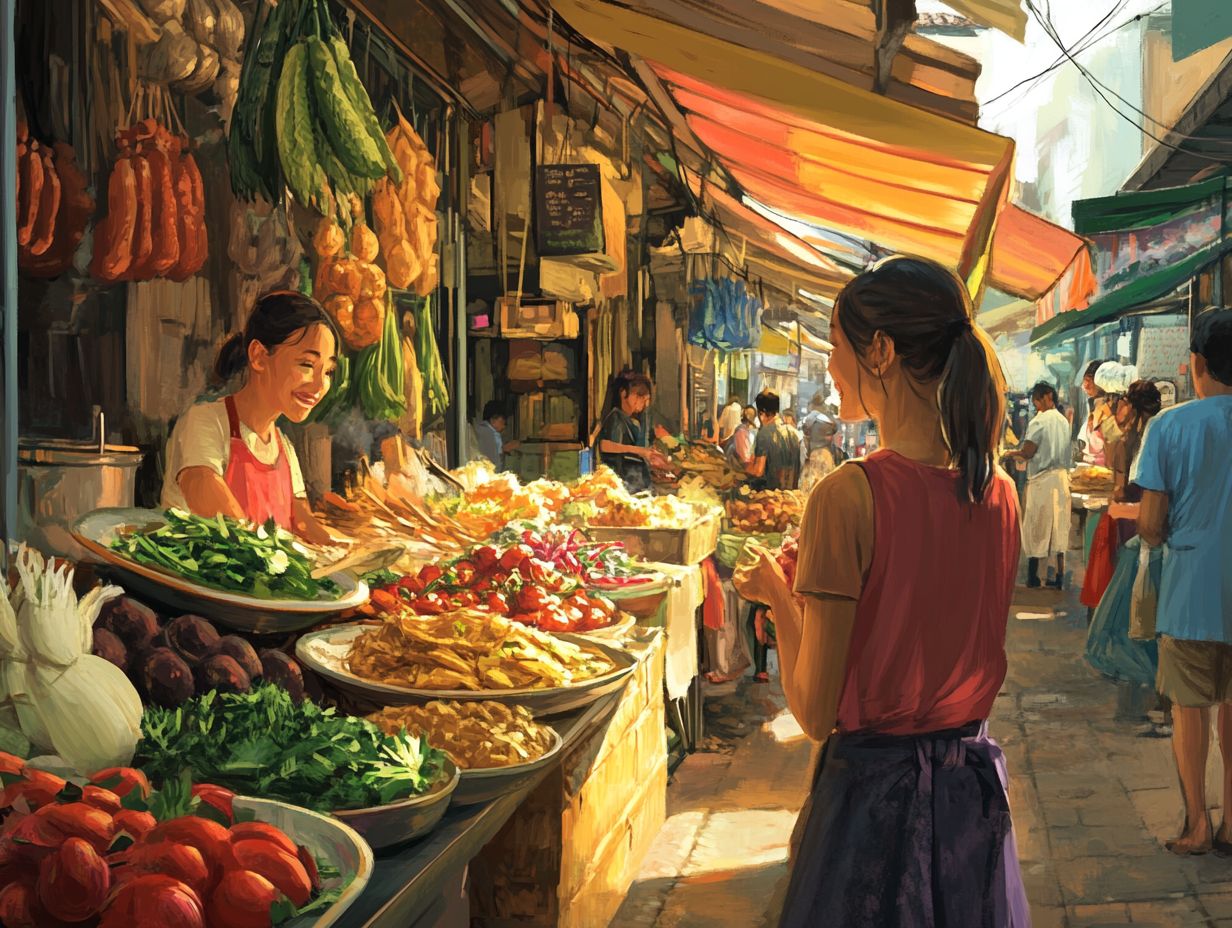Food Culture: Embracing Local Cuisine Abroad
Food culture is a rich tapestry crafted from the threads of history, tradition, and community, shaping your culinary experiences across the globe.
When you understand and embrace local cuisine while traveling, you deepen your appreciation for diverse cultures. You also reap health benefits and promote sustainability. However, navigating unfamiliar dishes can sometimes be a challenge.
This article delves into the essence of food culture, celebrating the joys of sampling local fare. It offers practical tips for honoring and enhancing your culinary adventures abroad.
Discover how to connect more meaningfully with the places you visit through the vibrant lens of their cuisine.
Contents
- Key Takeaways:
- Understanding Food Culture
- Benefits of Embracing Local Cuisine Abroad
- Challenges and Tips for Trying Local Cuisine
- How to Support and Respect Local Food Culture
- Frequently Asked Questions
- What is food culture?
- What are some benefits of trying local cuisine while traveling?
- How can I prepare for embracing local cuisine abroad?
- What are some tips for finding authentic local cuisine while abroad?
- Is it important to respect the cultural and religious beliefs surrounding food while traveling?
- How can I incorporate elements of local cuisine into my own cooking at home?
Key Takeaways:

- Embracing local cuisine abroad allows for cultural immersion and connection, providing a deeper understanding of a country’s traditions and customs.
- Trying local foods supports the community and brings health benefits from consuming fresh and traditional ingredients.
- To fully respect and support local food culture, practice sustainable and ethical eating habits. Appreciate and honor cultural traditions and customs.
Understanding Food Culture
Understanding food culture unlocks the heart of a nation! In Japan, this couldn t be more true. The rich tapestry of Japanese cuisine includes various elements, such as local dishes, historical customs, and unique dining experiences that shape the country s cultural identity.
From beautifully arranged meals to the symbolism woven into each dish, food acts as a medium for expressing and sharing local traditions. Exploring the culinary landscape of Japan reveals a world rich in meaning and connection. This transforms it into a significant cultural experience that resonates deeply.
Defining Food Culture and Its Importance
Food culture serves as a mirror reflecting a community’s history, traditions, and values. This is particularly evident in Japan, where cultural customs seamlessly intertwine with dining experiences.
This tapestry includes different elements, such as ingredients, cooking techniques, and ritualistic practices that elevate eating into a shared experience. In Japanese cuisine, food symbolism carries deep meaning, impacting everything from presentation to seasonal ingredients. For instance, the use of cherry blossoms or bamboo in dishes symbolizes not just seasonal transitions but also deeper cultural narratives surrounding impermanence and the appreciation of beauty.
By trying new foods, you foster a deeper understanding of these authentic traditions, allowing you to savor the rich flavors and stories behind each meal. This journey can bridge connections between diverse communities, cultivating respect and admiration for the unique cultural expressions found in food.
Benefits of Embracing Local Cuisine Abroad
Embracing local cuisine while abroad presents a wealth of benefits that extend far beyond flavor. For more insights, check out what to know about local cuisine. It enriches cultural immersion and elevates your appreciation for food, allowing you to savor authentic experiences that truly connect you to the essence of each destination.
Cultural Immersion and Connection

Cultural immersion through local cuisine enables you to forge deeper connections with communities. It offers a genuine taste of authentic dishes and local delicacies that truly capture the essence of a place.
Each dish often tells a story, bridging generations and reflecting the history, values, and traditions unique to the region. When you gather around a meal, you re not just sharing sustenance; you re exchanging narratives that foster understanding and appreciation for diverse backgrounds.
Exploring local delicacies becomes a gateway to more profound relationships within the community. You bond over shared tastes and culinary experiences. This connection transcends mere eating; it s about engaging with the roots of food culture that enrich our collective experiences and nurture lasting friendships.
Health Benefits of Local Foods
Eating local foods elevates your dining experience and offers remarkable health benefits. This is thanks to the use of seasonal ingredients and traditional cooking methods.
This mindful approach to food consumption provides a treasure trove of nutritional perks. Locally sourced produce is often harvested at its peak ripeness, ensuring both optimal flavor and maximum nutrient density. By embracing local diets, you enhance your well-being and play a vital role in preserving cultural traditions while nurturing food pride within your community.
Seasonal ingredients are typically fresher and bursting with flavor. They allow you to create dishes that resonate deeply with local culture and history. This connection to your roots strengthens the bond between food, tradition, and identity, fostering a more sustainable and health-conscious way of eating.
Challenges and Tips for Trying Local Cuisine
Embarking on the journey of savoring local cuisine can be immensely rewarding. However, it often presents challenges, such as language barriers, unfamiliar ingredients, and dining customs.
Overcoming Language Barriers
Overcoming language barriers is essential for a truly enriching dining experience. It helps you explore the nuances of food culture and local culinary traditions.
Effective communication elevates your enjoyment of a meal and enhances your appreciation for its cultural significance. To bridge these gaps, use translation apps that empower you to engage with local chefs and servers. This way, you grasp menu items and culinary specialties fully.
Learning a few key phrases in the local language shows your respect and interest in the culture. This often leads to deeper interactions and valuable insights. By embracing these approaches, you unlock the door to discovering authentic dishes and cultivate connections that enhance your overall experience.
Dealing with Unfamiliar Ingredients

Dealing with unfamiliar ingredients can be overwhelming, but it opens the door to culinary exploration and a deeper appreciation for local dishes. Instead of shying away, embrace the chance to learn about the culture and history behind these unique elements.
Imagine the excitement of trying dishes that highlight exotic spices like sumac in a Middle Eastern tabbouleh or diving into the subtle complexities of miso in Japanese ramen each experience can be enlightening.
Consider the bold flavors of a Southeast Asian curry infused with galangal or the refreshing sweetness of jicama in Mexican salads. By approaching these ingredients with curiosity, you elevate your palate and enrich your understanding of the diverse culinary landscapes you re exploring.
How to Support and Respect Local Food Culture
Supporting and respecting local food culture is vital for strengthening community ties and preserving culinary traditions. These traditions embody the essence of a region’s identity. By embracing unique food practices, you contribute to the local economy and help maintain the rich tapestry of flavors and stories that define the area.
This commitment to regional cuisine fosters a deeper connection among residents, creating a vibrant community that honors its heritage while looking to the future.
Sustainable and Ethical Eating Practices
Sustainable and ethical eating practices are more essential than ever. They enhance your dining experience while emphasizing the value of local ingredients and ethical sourcing.
By prioritizing locally sourced items, you support regional farmers and artisans while indulging in the exceptional freshness and quality that seasonal produce offers. This mindful approach cultivates a deeper connection between you and your food, enriching your appreciation for local culinary traditions.
As these practices gain momentum, they inspire restaurants to craft menus showcasing the distinctive flavors of the community. This allows you to fully immerse yourself in the local food culture.
The ripple effect of these thoughtful choices nurtures the environment and fosters a sense of pride and sustainability within the dining landscape. Don’t miss out on the chance to explore local flavors today!
Dive into Cultural Traditions and Customs
Appreciating the cultural traditions and customs surrounding food is essential for a deeper understanding of a community’s culinary heritage. This appreciation elevates your overall food experiences.
These elements act as a window into the values, beliefs, and stories that shape a region’s food culture. When you engage with local dining etiquette, such as the simple act of sharing a meal or the intricate rituals involved in preparation and service, you create avenues for connection and dialogue.
Understanding these practices allows you to savor local ingredients and recipes more fully, revealing the rich tapestry of heritage and innovation. By respecting and embracing these cultural nuances, you not only enjoy a meal but also contribute to preserving the traditions that define a community’s identity.
Frequently Asked Questions

What is food culture?
Food culture includes the traditions, customs, and practices surrounding food and eating in a specific area. Embracing local cuisine while traveling allows for a deeper understanding and appreciation of a new culture, as food is a significant aspect of a country’s identity and history.
What are some benefits of trying local cuisine while traveling?
Trying local cuisine enhances your overall experience by exposing you to new flavors and ingredients, helping you understand the local culture, and supporting the local economy.
How can I prepare for embracing local cuisine abroad?
Researching the local cuisine before your trip helps familiarize you with the different dishes and ingredients. Being open-minded and willing to try new foods makes the experience more enjoyable.
What are some tips for finding authentic local cuisine while abroad?
To find authentic local cuisine, ask locals for recommendations or visit markets and street food stalls. Look for restaurants with menus written in the local language or those frequented by locals rather than tourists.
Is it important to respect the cultural and religious beliefs surrounding food while traveling?
Yes, respecting the cultural and religious beliefs surrounding food is essential. This may involve avoiding certain foods or practices out of respect for the local culture, such as refraining from eating beef in countries where it is considered sacred.
How can I incorporate elements of local cuisine into my own cooking at home?
You can incorporate elements of local cuisine into your cooking by experimenting with new ingredients and recipes, taking cooking classes while abroad, and learning about the history and cultural significance of certain dishes. Try to recreate dishes you enjoyed while traveling and share them with friends and family.
Next time you travel, dive into the local cuisine and make unforgettable memories!






